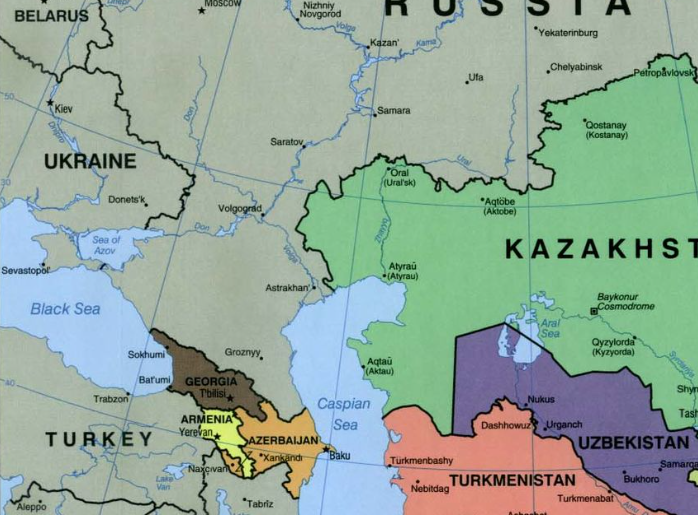CACI Webinar: The Growing Role of the S. Caucasus in European Energy Security
CACI Webinar: The Growing Role of the S. Caucasus in European Energy Security
Join our experts for a webinar discussing growing energy collaboration between the South Caucasus and Europe. They will provide a status update on growing supply of natural gas from Azerbaijan to several EU member countries, as well as on the prospect for energy transit from Central Asia and the potential for green energy supply by submarine power line under the Black Sea connecting Azerbaijan, Georgia, Romania and Hungary.
Panelists:
- Prof. Brenda Shaffer, U.S. Naval Postgraduate School
- Dr. Mamuka Tsereteli, Senior Fellow for Eurasia, Central Asia-Caucasus Institute at the American Foreign Policy Council
Moderator:
Dr. Svante Cornell, Director, Central Asia-Caucasus Institute at the American Foreign Policy Council
WHEN: Monday, March 6, 2023, 10:00-11:00 AM EST
Black Sea Cables to Slake Europe’s Thirst for Energy
By Mamuka Tsereteli
January 31, 2023
https://cepa.org/article/black-sea-cables-to-slake-europes-thirst-for-energy/
The world’s longest and deepest undersea power and digital cable line is to be laid between the eastern and western shores of the Black Sea.
The commitment was made by the leaders of Azerbaijan, Georgia, Romania, and Hungary in Bucharest on December 17. The deal foresees the transmission of green energy from the South Caucasus to Europe, and forms part of the European Union’s (EU) wider plans for energy diversification; It was praised byCommission President Ursula von der Leyen as a project “full of possibilities.”
Azerbaijan, a key producer of oil and natural gas, already plays a significant role in European energy security through recently agreed deals with the EU. In addition, both Azerbaijan and Georgia are important energy transit countries for Turkey, and Southern and South-eastern Europe. Key economic projects with geopolitical significance, like the Baku-Tbilisi-Ceyhan (running from Azerbaijan to Turkey) and Baku-Supsa oil pipelines, and the Southern Gas Corridor (again running east-west through Turkey) have elevated the importance of Azerbaijan as a major energy security player for Europe.
The EU’s decision to support the undersea power line between Georgia and Romania represents a significant development. It will allow electricity produced in Azerbaijan, Georgia, and other countries to be delivered directly to the European market. It will also help clean energy-producing countries to attract more foreign direct investment in hydro, wind, and solar power generation.
While Azerbaijan’s Caspian Sea wind farms may be the leading source of electricity for the power line, a preliminary economic analysis has demonstrated that the participation of the other South Caucasus countries will be important for its ultimate commercial success.
With the Russian invasion of Ukraine and the loss of Russian energy supplies, the EU’s need to diversify its energy sources, including both fossil fuels and renewables, is greater than ever. Naturally, this makes Azerbaijan increasingly important as a partner. The July 2022 visit to Baku of von der Leyen, and the subsequent signing of an energy agreement between the EU and Azerbaijan on increased natural gas supplies to Europe via the Southern Gas Corridor, have significantly elevated bilateral ties. That, in turn, has paved the way for a growing understanding of mutual dependence, as well as expanded collaboration on economic projects.
While Russia is having enormous problems, it is also adapting and preparing for a protracted conflict. Despite multiple shortcomings, ranging from a lack of discipline and cumbersome logistics to sluggish command and control (C2) and inadequate intelligence, surveillance, and reconnaissance (ISR), Russian forces have stabilized a vast front, entrenched themselves, and increased the attrition for Ukrainian units, especially in the Donbas.
This growing closeness serves as the backdrop for the most recent breakthrough by Georgia, Azerbaijan’s regional neighbor. The idea of the submarine power line between Georgia and Romania was born during the country’s partnership discussions with the EU back in 2018. The initial concept was based on Georgia’s interest in boosting its economic integration with the bloc, as well as the potential to export hydro energy to Europe. This led Georgia to request a pre-feasibility study from the World Bank, which was completed in 2020 (and is now publicly available.) The project, in turn, received a new boost with Azerbaijan’s interest in developing its vast wind power generation potential in the Caspian.
Georgia is now moving forward to the feasibility study stage, funded by the World Bank, which should confirm the project’s commercial viability, optimal transmission capacity, and exact routing. It will also examine some of the technical challenges, including the difficult geography of the Black Sea, as well as the need to cross two undersea natural gas pipelines connecting Russia and Turkey. In addition, the feasibility study will assess a need for additional power infrastructure at the Georgian and Romanian ends in order to ensure the stable operation of their power grids.
Initial costs estimates are around €2.5bn ($2.7bn), with one potential source of funding the EU’s funding European Economic and Investment Plan. Other finance may come from the European Bank for Reconstruction and Development (EBRD), the US International Development Finance Corporation (DFC), and others. Given the involvement of Romania and Hungary, both members of the Three Sea Initiative (3SI), it would be natural to have the 3SI Fund involved as well.
There have been several past projects to transmit energy from the eastern to western shores of the Black Sea, but they have foundered because of an array of political, economic, and technical problems. These include the White Stream natural gas pipeline project to ship Turkmen gas to Europe via Azerbaijan and Georgia, as well as the Azerbaijan-Georgia-Romania liquefied natural gas (LNG) interconnector project.
Yet this time there is a discernible political will to get the infrastructure built. The severance of Russian supplies was a serious shock for Europe and the urgent need to meet climate change objectives with greener energy are both providing significant momentum. The undersea power cable project has a realistic chance for implementation. That would blaze a trail for other projects to help boost connectivity in the Black Sea.
Mamuka Tsereteli, Ph.D. is Senior Fellow for Eurasia, American Foreign Policy Council/Central-Asia Caucasus Institute.
Religion as a Factor in Caucasian Conflicts
Svante E. Cornell
Civil Wars,
Vol. 1 no. 3, 1998
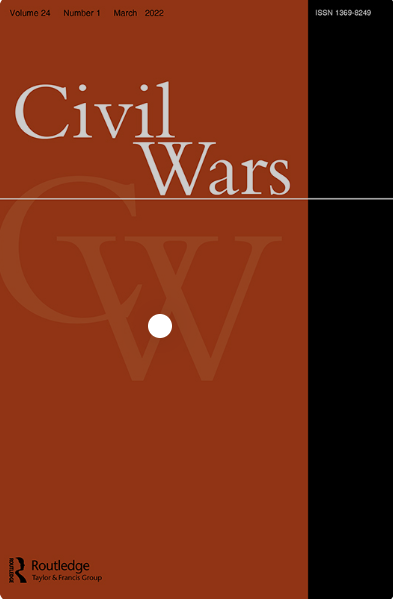 The many conflicts that have raged in the Caucasus since the end of the 1980s have often been depicted in the media and academia as basically religous in character. The religious differences between parties to conflicts are empjasized and often exaggerated. In particular, the Caucasus has been taken as an example of the 'clash of civilzations' supposedly under way. This article seeks to challenge this perception of the Caucasian conflicts, arguing that religion has played a limited role in conflicts that are actually ehnopolitical and territorial in character. The article argues that seldom are religious bodies of thinking used to legitimize conflict behaviour in this region -- there has been no Jihad in the Caucasus, for example -- nor has the politicization of the parties to a conflict been underpinned primarily by religious identity or theological perspetives. As such, religious conflict can not be spoken of. Furthermore ther has occured no rallying of outside powers along religious lines; quite to the contrary empirical evidence shows hat religious has had little impact -- especially when compared to ethnicity -- in the international ramifications of these conflicts.
The many conflicts that have raged in the Caucasus since the end of the 1980s have often been depicted in the media and academia as basically religous in character. The religious differences between parties to conflicts are empjasized and often exaggerated. In particular, the Caucasus has been taken as an example of the 'clash of civilzations' supposedly under way. This article seeks to challenge this perception of the Caucasian conflicts, arguing that religion has played a limited role in conflicts that are actually ehnopolitical and territorial in character. The article argues that seldom are religious bodies of thinking used to legitimize conflict behaviour in this region -- there has been no Jihad in the Caucasus, for example -- nor has the politicization of the parties to a conflict been underpinned primarily by religious identity or theological perspetives. As such, religious conflict can not be spoken of. Furthermore ther has occured no rallying of outside powers along religious lines; quite to the contrary empirical evidence shows hat religious has had little impact -- especially when compared to ethnicity -- in the international ramifications of these conflicts.
CACI Initiative on Religion and the Secular State in Central Asia and the Caucasus
In 2016, the Central Asia-Caucasus Institute & Silk Road Studies Program launched an initiative on documenting the interrelationship of religion and the secular state in the region. This initiative departed from the fact that little systematic reserch had been undertaken on the subject thus far. While there was and remains much commentary and criticism of religious policy in the region, there was no comprehensive analysis available on the interrelationship of religion and the state in any regional state, let alone the region as a whole. The result of this initiative has been the publication of six Silk Road Papers studying the matter in regional states, with more to come. In addition, work is ongoing on a volume putting the regional situation in the context of the Muslim world as a whole.
Case Studies
Each study below can be freely downloaded in PDF format.
Azerbaijan's Formula: Secular Governance and Civil Nationhood
By Svante E. Cornell, Halil Karaveli, and Boris Ajeganov
November 2016
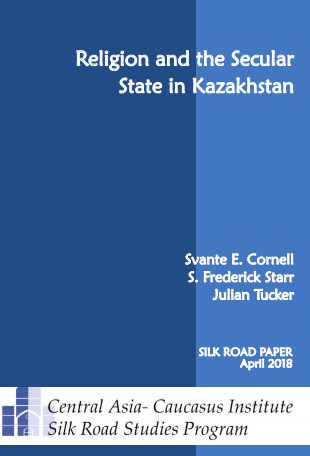 Religion and the Secular State in Kazakhstan
Religion and the Secular State in Kazakhstan
By Svante E. Cornell, S. Frederick Starr and Julian Tucker
April 2018
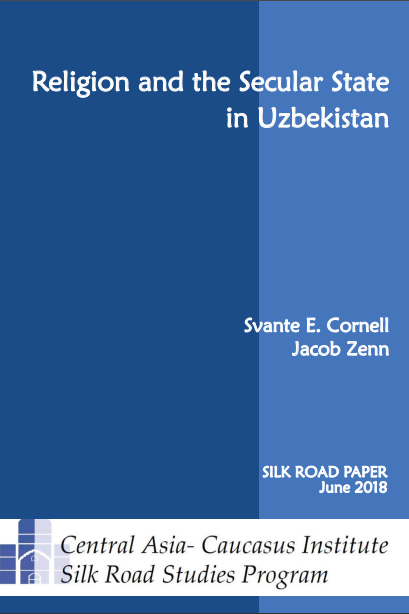 Religion and the Secular State in Uzbekistan
Religion and the Secular State in Uzbekistan
Svante E. Cornell and Jacob Zenn
June 2018
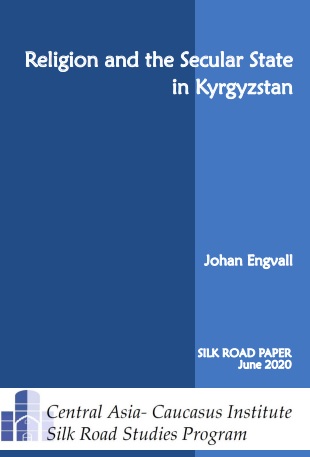 Religion and the Secular State in Kyrgyzstan
Religion and the Secular State in Kyrgyzstan
Johan Engvall
June 2020
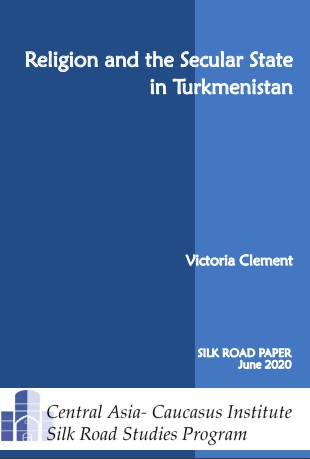 Religion and the Secular State in Turkmenistan
Religion and the Secular State in Turkmenistan
Victoria Clement
June 2020
Articles and Analyses
Svante E. Cornell, "Religion and the State in Central Asia," in Ilan Berman, ed., Wars of Ideas: Theology, Interpretation and Power in the Muslim World, Lanham, MD: Rowman & Littlefield, 2021.
Svante E. Cornell, "Central Asia: Where Did Islamic Radicalization Go?" in Religion, Conflict and Stability in the Former Soviet Union, eds. Katya Migacheva and Bryan Frederick, Arlington, VA: RAND Corporation, 2018.

